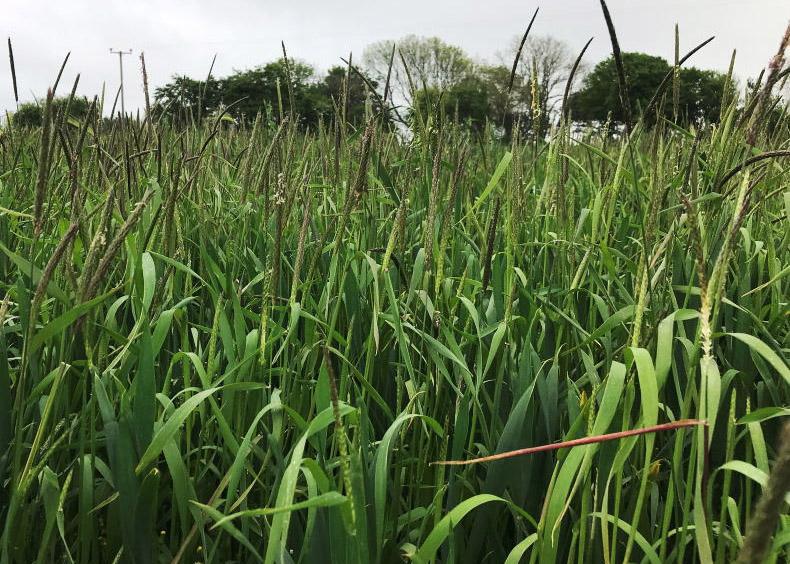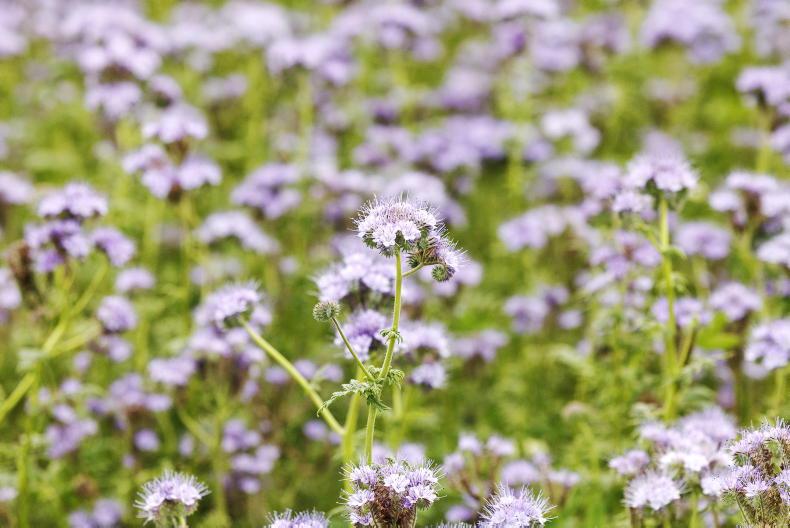John Joe Byrne is head of seed certification at the Department of Agriculture. He explained the rigorous standards that certified seed has to meet before it is given that all-important blue label. He also noted that red-label, or second-generation seed, is not produced in Ireland.
Three field inspections are carried out by the Department each year. On blackgrass, there is a zero-tolerance approach. John Joe explained that if blackgrass is found during any field inspection, the crop is rejected on the spot – as was the case with the eight rejected crops found with blackgrass in 2022.
There is a zero tolerance for wild oats and sterile brome on the final crop inspection.
A harvest inspection also looks at machinery hygiene. Some seed assemblers encourage farmers to send the headlands of seed crops to the feed market, as grass weed problems often start in the headland.
John Joe explained that a sample from each certified seed lot is tested in the seed testing laboratory in Backweston, which is one of only 149 laboratories accredited by the International Seed Testing Association. Two certificates are issued to say it was sampled and tested correctly and to certify the tests.
Certified seed standards
Germination of 85%.Analytical purity of 98% on blue-label seed.Tested for Michrodocium nivale, Fusarium spp and loose smut.Ireland implements a zero-tolerance policy on blackgrass, wild oats and sterile brome.Comment: farmers have to act responsibly on blackgrass
We are lucky to have a proactive seed industry in Ireland. For example, EU and UK seed standards do not require zero tolerance for blackgrass.
However, farmers must take advantage of those high standards and show responsibility as well.
We have a recommended list in this country for a reason.
The Department of Agriculture tests varieties to suit Irish conditions. Certified seed is free of invasive and noxious weeds.
Now cover crop seed is available with a zero-tolerance for blackgrass.
Farmers need to make the right decision on seed
If farmers import seed from the UK, where the blackgrass problem has now almost become normalised and there is a tolerance for blackgrass in some seed, then there is a significant possibility that the seed will have blackgrass in it.
Farmers need to make the right decision on seed. Importing a variety that is not on the recommended list and is not certified risks blackgrass entering your farm, your neighbour’s farm and farms in the neighbouring county.
Careful with cover crops
Now that blackgrass-free seed is available, ordering and importing cover crop seeds which do not adhere to the higher voluntary standard scheme is irresponsible.
It is important now that this seed is available that specifications for growing catch crops under ACRES not only specify mixtures, but also specify that this seed should be used.
John Joe Byrne is head of seed certification at the Department of Agriculture. He explained the rigorous standards that certified seed has to meet before it is given that all-important blue label. He also noted that red-label, or second-generation seed, is not produced in Ireland.
Three field inspections are carried out by the Department each year. On blackgrass, there is a zero-tolerance approach. John Joe explained that if blackgrass is found during any field inspection, the crop is rejected on the spot – as was the case with the eight rejected crops found with blackgrass in 2022.
There is a zero tolerance for wild oats and sterile brome on the final crop inspection.
A harvest inspection also looks at machinery hygiene. Some seed assemblers encourage farmers to send the headlands of seed crops to the feed market, as grass weed problems often start in the headland.
John Joe explained that a sample from each certified seed lot is tested in the seed testing laboratory in Backweston, which is one of only 149 laboratories accredited by the International Seed Testing Association. Two certificates are issued to say it was sampled and tested correctly and to certify the tests.
Certified seed standards
Germination of 85%.Analytical purity of 98% on blue-label seed.Tested for Michrodocium nivale, Fusarium spp and loose smut.Ireland implements a zero-tolerance policy on blackgrass, wild oats and sterile brome.Comment: farmers have to act responsibly on blackgrass
We are lucky to have a proactive seed industry in Ireland. For example, EU and UK seed standards do not require zero tolerance for blackgrass.
However, farmers must take advantage of those high standards and show responsibility as well.
We have a recommended list in this country for a reason.
The Department of Agriculture tests varieties to suit Irish conditions. Certified seed is free of invasive and noxious weeds.
Now cover crop seed is available with a zero-tolerance for blackgrass.
Farmers need to make the right decision on seed
If farmers import seed from the UK, where the blackgrass problem has now almost become normalised and there is a tolerance for blackgrass in some seed, then there is a significant possibility that the seed will have blackgrass in it.
Farmers need to make the right decision on seed. Importing a variety that is not on the recommended list and is not certified risks blackgrass entering your farm, your neighbour’s farm and farms in the neighbouring county.
Careful with cover crops
Now that blackgrass-free seed is available, ordering and importing cover crop seeds which do not adhere to the higher voluntary standard scheme is irresponsible.
It is important now that this seed is available that specifications for growing catch crops under ACRES not only specify mixtures, but also specify that this seed should be used.










SHARING OPTIONS